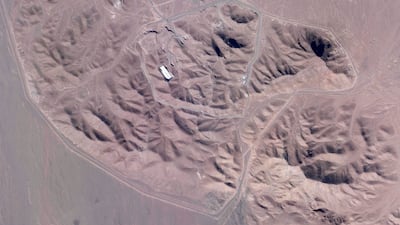Iranian negotiators on Wednesday presented to European powers draft proposals on sanctions removal and nuclear commitments.
The texts will help to determine whether there is the basis for a deal to revive the 2015 nuclear accord.
The drafts were submitted to European diplomats on Wednesday night and were “a demonstration of our seriousness”, said Ali Bagheri Kani, Iran's chief nuclear negotiator.
The announcement came on the fourth day of indirect talks between Iran and the United States on bringing both fully back into the deal.
The negotiations in Vienna are the first since the election in June of Iran’s President Ebrahim Raisi.
"We have delivered two proposed drafts to them ... of course they need to check the texts that we have provided to them. If they are ready to continue the talks, we are in Vienna to continue the talks," Mr Kani said.
A European diplomat in Vienna confirmed to Reuters that draft documents had been handed over.
Iran's top diplomat on Thursday said that an agreement to revive the nuclear deal, officially known as the Joint Comprehensive Plan of Action, was "within reach" but that this depended on the goodwill of the West.
Foreign Minister Hossein Amir-Abdollahian said on Twitter that negotiations in Vienna were "proceeding with seriousness" and that the removal of sanctions was a "fundamental priority".
In his tweet on Thursday, Iran's foreign minister said the expert talks were continuing and that he was in daily contact with his deputy and lead negotiator, Mr Kani.
"Good deal within reach if the West shows good will. We seek rational, sober and result-oriented dialogue," Mr Amir-Abdollahian said.
Under the 2015 agreement, Tehran limited its uranium enrichment programme – a potential pathway to nuclear weapons although Iran says it seeks only civilian atomic energy – in exchange for relief from US, European Union and UN economic sanctions.
But in 2018, Donald Trump, who was US president at the time, abandoned the deal, saying that it was too soft on Iran, and reimposed US sanctions, spurring Tehran to breach nuclear limits in the pact.
While Mr Kani had said everything negotiated during six rounds of talks between April and June was open for discussion, a member of Iran's delegation said "elements in the previous unapproved draft that were in conflict with the nuclear deal were revised and gaps were filled" in Iran's submitted drafts.
A senior European diplomat estimated on Tuesday that 70 per cent to 80 per cent of a draft deal on salvaging the 2015 accord was completed when Iran and world powers last met in June, although it was unclear if Tehran would resume talks where they left off.
Israel, which opposed the original 2015 agreement as too limited in scope and duration, urged world powers on Thursday to halt the talks immediately.
It cited a UN nuclear watchdog report that Tehran has begun refining uranium with more advanced centrifuges in its Fordow plant dug into a mountain, where any enrichment had been banned under the deal.
The International Atomic Energy Agency said on Wednesday Iran has begun the process of enriching uranium to 20 per cent purity with advanced centrifuges at its Fordow site, yet another breach of the deal Tehran agreed to with world powers in 2015.
The IAEA announced the country's latest nuclear activities after agreeing with Tehran “to increase the frequency of verification” at the Fordow facility.
European diplomats have said addressing Iran's use of the advanced centrifuges to enrich uranium is still a crucial sticking point in the negotiations.
“The advanced centrifuges present a conundrum because they constitute both an irreversible gain in knowledge and because if not destroyed, they can be quickly reassembled in the future, making it hard to meet the one-year breakout criterion [of preventing Iran from being able to produce a weapon's worth of highly enriched uranium],” said Mark Fitzpatrick, an associate fellow at the International Institute for Strategic Studies and former acting deputy assistant secretary for non-proliferation at the US State Department.
“But under the JCPOA, centrifuges that were removed from operation only had to be put in storage, so Iran has a point in arguing that the demand for destruction is not in keeping with the 2015 deal.”


